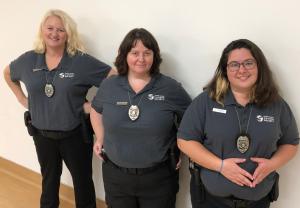Humane Law Enforcement at MHHS
Humane Law Enforcement: Protecting Pets, Helping People
At MHHS, our Peace Officers can investigate animal cruelty, apply for search warrants and arrest warrants, and make arrests when necessary, but we strongly believe that our community’s pets are best served when we work in partnership with local law enforcement agencies. Our officers work hand-in-hand with local animal control, police departments, and sheriffs by providing animal handling, animal cruelty, and animal law expertise.
We currently have three officers on staff and have begun the process of training five more. All of our officers have other full-time responsibilities, allowing for specialization in key areas of Humane Law Enforcement.
Admitting: Many cases begin at our front door.
Although they may not be presented as such, possible cases of abuse and neglect come to our door regularly. Collection of information for every animal that comes to us is always important, but in possible cases of abuse, it can make all the difference in whether an abuser is brought to justice or never held accountable. From accurate identification of the individual presenting the animal and specifics about where the animal was found, to any clues that may have been at the site and evidence collection, no detail can be taken for granted. Intake officers must be adept at asking questions and separating fact from fiction, as they can never assume what they are being told is true.
Cruelty: We’re always on call to help.
We are always ready to mobilize when our partners in law enforcement call on us to help with cases of animal cruelty. From active physical abuse to hoarding, neglect, and abandonment, we have to be ready to handle it all. When we are called to a scene, we take a backseat to the police officers who are trained to clear and secure it, review search warrants to be certain we know our legal parameters for search and seizure, and then take the lead in evaluating, documenting and, when necessary, removing the animals.
We recognize how difficult it is for the police to prioritize animal cruelty cases among the many other crimes they investigate, and that training in Agriculture and Markets Law, where animal cruelty statutes are found, is not typically part of their training. This makes animal cruelty charges a heavy lift for any already stretched thin police officer. We are here to help lighten the load by providing assistance with paperwork and documentation, thorough forensic veterinary evaluations, behavioral evaluations, and guidance on charges under Agriculture and Markets Law.
As the case proceeds, we follow it through the court system. We work with the assigned attorney throughout prosecution, providing feedback when requested, documentation, and even testimony in court. People often assume that the best possible outcome in the case of animal cruelty charges is conviction. We have found, however, in many cases the best outcome can be a thoughtfully written adjudication in contemplation of dismissal (ACOD). An ACOD can set limits on pet ownership and allow for follow-up visits by our officers. We know that recidivism is nearly 100% in animal hoarding cases, and that animal hoarding is typically a mental health issue, which means that a fine or jail sentence is not going to serve the person or the pets as well as continued monitoring and assistance will.

MHHS Humane Law Enforcement Officers:
Director of Behavior and Enrichment Nancy Haynes
Senior VP for Operations Gail Hughes-Morey
Placement Manager Jillian Leibach
Outreach: Good cops offer help and solutions.
One of the most important roles of a Peace Officer in Humane Law Enforcement is Community Outreach. Oftentimes pets are neglected due to a lack of resources or because the person simply does not know how to properly care for a particular pet. Our Peace Officers will be going out into the community and offering up resources, education, and sharing information about our free pet pantry, low-income spay/neuter surgeries, and vaccine services. While our main focus is animals, partnering with our community is the key to ensuring animals receive the care they need to be happy, healthy and loved. If we can step in with food, reduced-cost veterinary care or supplies, along with some education, we can improve the lives of pets and their owners and hopefully prevent legal intervention down the road.
What can you do when you suspect an animal is in danger?
Always call local animal control or the police first. They are always on call and your best resource for an immediate response. They will call us in when they need us. However, if you need guidance before going to the police, we can explain the best way to make an animal cruelty complaint so that it will get the attention it deserves.
How to Report Cruelty
Try to gather the following information before making a call.
- Prepare a concise, factual written statement of what you observed—giving dates and approximate times whenever possible—to provide to law enforcement.
- If possible, get photographs of the location, the animals in question and the surrounding area. But when doing this, DO NOT put yourself in danger! Do not enter another person's property without permission. Exercise great caution around unfamiliar animals who may be frightened or in pain.
- If you can, provide law enforcement with the names and contact information of other people who have firsthand information about the abusive situation.
- It is possible to file an anonymous report, but please consider providing your information. The case is more likely to be pursued when there are credible witnesses willing to stand behind the report and, if necessary, testify in court.
Contact us at 518-343-8128 or animalcruelty@mohawkhumane.org.
